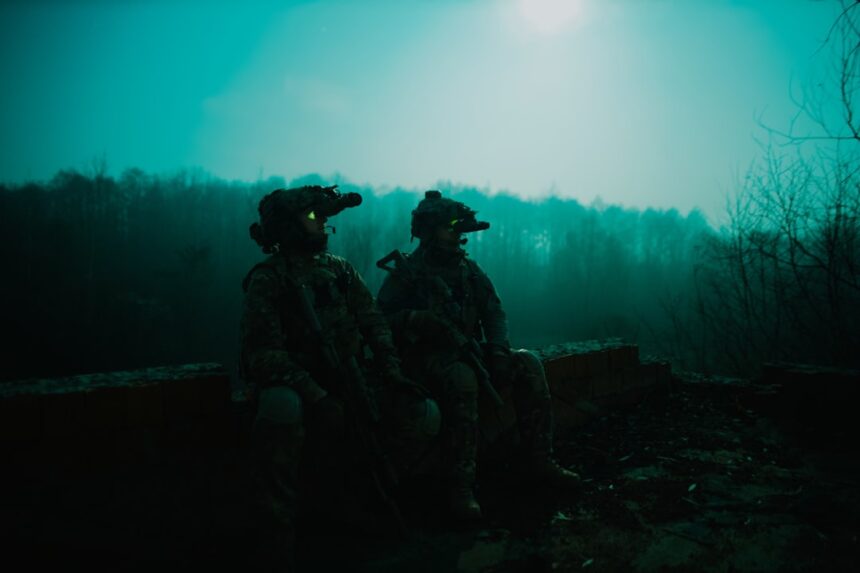Private Military Contractors (PMCs) are private companies that provide military and security services to governments, corporations, and other entities. These services can range from logistical support and training to armed security and direct combat operations. Unlike traditional military forces, PMCs operate on a for-profit basis, which often leads to a complex interplay of interests between the contractors, their clients, and the geopolitical landscape.
The rise of PMCs has transformed the way military operations are conducted, blurring the lines between state and non-state actors in conflict zones. The emergence of PMCs has been driven by various factors, including the increasing privatization of military functions, the need for specialized skills in modern warfare, and the desire for governments to outsource certain military operations. This trend has led to a diverse array of companies offering a wide range of services, each with its own unique capabilities and areas of expertise.
As a result, PMCs have become integral players in contemporary security dynamics, often operating in environments where traditional military forces may be constrained by political or legal considerations.
Key Takeaways
- Private Military Contractors (PMCs) are private companies that provide military and security services to governments, corporations, and other clients.
- PMCs have a long history dating back to ancient times, but their modern form emerged in the late 20th century with the end of the Cold War and the rise of globalization.
- In modern warfare, PMCs play a significant role in providing support services such as logistics, training, and security, allowing governments to focus on combat operations.
- The use of PMCs raises legal and ethical concerns, including accountability, transparency, and human rights violations, which have sparked debates and controversies.
- PMCs recruit and train personnel from military and law enforcement backgrounds, offering a wide range of services including combat operations, intelligence, and security consulting.
The History of Private Military Contractors
The history of Private Military Contractors can be traced back to ancient times when mercenaries were employed by city-states and kingdoms to bolster their military capabilities. However, the modern incarnation of PMCs began to take shape in the late 20th century, particularly during the Cold War. As conflicts around the globe intensified, governments sought ways to augment their military forces without committing their own troops.
This led to the emergence of private firms that could provide specialized services, often in high-risk environments. The Gulf War in the early 1990s marked a significant turning point for PMCs. The demand for logistical support and security services surged as coalition forces engaged in combat operations.
Companies like Blackwater (now known as Academi) gained notoriety for their involvement in Iraq and Afghanistan, providing everything from security for diplomats to direct combat support.
The Role of Private Military Contractors in Modern Warfare

In contemporary conflicts, Private Military Contractors play multifaceted roles that extend beyond traditional combat operations. They often provide critical support functions such as intelligence gathering, training local forces, and securing supply chains. By leveraging their expertise and resources, PMCs enable governments to conduct military operations more efficiently while minimizing the risks associated with deploying conventional troops.
This has proven particularly valuable in asymmetric warfare scenarios where state forces face non-state actors. Moreover, PMCs have become instrumental in stabilizing post-conflict regions. Their ability to quickly mobilize resources and personnel allows them to fill security gaps in fragile states, assisting in rebuilding efforts and maintaining order.
However, this involvement is not without its challenges. The presence of PMCs can complicate the dynamics of local governance and security, as their motivations may not always align with those of the host nation or its citizens.
The Legal and Ethical Issues Surrounding Private Military Contractors
| Issues | Details |
|---|---|
| Legal Accountability | PMCs operate in a legal gray area, making it difficult to hold them accountable for their actions. |
| Human Rights Violations | There have been numerous reports of PMCs being involved in human rights abuses, raising ethical concerns. |
| Transparency | PMCs often operate with little transparency, making it challenging to assess their actions and impact. |
| Regulation | There is a lack of international regulation governing the activities of PMCs, leading to potential legal and ethical issues. |
The rise of Private Military Contractors has given rise to a host of legal and ethical dilemmas that challenge existing frameworks governing armed conflict. One of the primary concerns is accountability; when PMCs operate in conflict zones, determining who is responsible for their actions can be murky. Unlike regular military personnel who are subject to military law, contractors often fall into a legal gray area that complicates prosecution for misconduct or war crimes.
Ethically, the use of PMCs raises questions about the commodification of violence and the implications of outsourcing military functions to profit-driven entities. Critics argue that this trend undermines the principles of sovereignty and accountability that underpin international law. Furthermore, incidents involving PMCs have sparked public outrage and calls for greater oversight, highlighting the need for a comprehensive regulatory framework that addresses these complex issues.
The Recruitment and Training of Private Military Contractors
Recruitment practices for Private Military Contractors vary widely depending on the specific needs of the company and the nature of the services offered. Many PMCs seek individuals with prior military experience, often targeting veterans who possess specialized skills relevant to security operations. This focus on experienced personnel ensures that contractors are equipped to handle high-stress situations and operate effectively in hostile environments.
Training programs for PMCs are designed to prepare contractors for the unique challenges they may face in the field. These programs often include tactical training, weapons proficiency, and cultural awareness courses to ensure that contractors can navigate complex social dynamics in conflict zones. Additionally, some companies emphasize ongoing training and professional development to maintain high standards of performance and adaptability in an ever-evolving security landscape.
The Services Offered by Private Military Contractors

Private Military Contractors offer a diverse array of services tailored to meet the needs of their clients. These services can be broadly categorized into three main areas: security services, logistical support, and consulting. Security services encompass armed protection for individuals or assets, risk assessments, and crisis management solutions.
PMCs often deploy teams to safeguard diplomats, corporate executives, or critical infrastructure in unstable regions. Logistical support provided by PMCs includes transportation, supply chain management, and maintenance of equipment. This aspect is crucial in ensuring that military operations run smoothly and efficiently, particularly in remote or hostile environments where traditional supply lines may be compromised.
Consulting services offered by PMCs can involve strategic planning, intelligence analysis, and training programs designed to enhance the capabilities of local forces or government agencies.
The Relationship Between Private Military Contractors and Governments
The relationship between Private Military Contractors and governments is complex and multifaceted. On one hand, governments rely on PMCs to fulfill specific operational needs without committing their own military resources. This partnership allows states to maintain flexibility in their military engagements while leveraging the expertise of private firms.
However, this reliance also raises concerns about accountability and oversight. Governments must navigate a delicate balance between utilizing PMCs for efficiency and ensuring that these contractors operate within legal and ethical boundaries. The lack of clear regulations governing PMC activities can lead to situations where contractors operate with impunity, potentially undermining national interests or exacerbating conflicts.
As such, fostering a transparent relationship between governments and PMCs is essential for maintaining public trust and ensuring responsible conduct in military operations.
The Impact of Private Military Contractors on Global Security
The proliferation of Private Military Contractors has had a profound impact on global security dynamics. On one hand, they provide essential capabilities that enhance national security efforts and contribute to stability in conflict-affected regions. By offering specialized skills and rapid response capabilities, PMCs can fill critical gaps in security provision where state forces may be limited or unwilling to engage.
Conversely, the presence of PMCs can also exacerbate tensions within conflict zones. Their involvement may lead to perceptions of foreign intervention or exploitation, potentially fueling resentment among local populations. Additionally, the lack of oversight can result in human rights abuses or violations of international law, further complicating efforts to achieve lasting peace and stability.
As such, understanding the dual-edged nature of PMCs is crucial for policymakers seeking to navigate the complexities of modern security challenges.
The Controversies and Scandals Involving Private Military Contractors
The activities of Private Military Contractors have not been without controversy or scandal. High-profile incidents involving contractors have drawn significant media attention and public scrutiny, raising questions about accountability and oversight within the industry. One notable example is the 2007 Nisour Square shooting in Baghdad, where employees of Blackwater killed 17 Iraqi civilians during a convoy operation.
This incident sparked outrage both domestically and internationally, leading to calls for greater regulation of PMCs. Such controversies have highlighted the potential for abuse inherent in privatizing military functions. Critics argue that the profit motive can lead to reckless behavior or prioritization of corporate interests over ethical considerations.
As a result, many advocate for stricter regulations governing PMC activities to ensure accountability and protect human rights in conflict zones.
The Future of Private Military Contractors
The future of Private Military Contractors is likely to be shaped by evolving geopolitical dynamics and changing perceptions of their role in global security. As conflicts become increasingly complex and asymmetric warfare continues to rise, the demand for specialized services provided by PMCs may grow. However, this expansion will also necessitate greater scrutiny regarding their operations and accountability mechanisms.
Technological advancements may also play a significant role in shaping the future landscape of PMCs. The integration of artificial intelligence, drones, and other emerging technologies into military operations could redefine how contractors operate on the battlefield. As these changes unfold, it will be essential for policymakers to establish clear guidelines that address both the opportunities and challenges presented by an evolving PMC industry.
The Importance of Regulating Private Military Contractors
Regulating Private Military Contractors is crucial for ensuring accountability, transparency, and ethical conduct within the industry. As PMCs continue to play an increasingly prominent role in global security dynamics, establishing comprehensive regulatory frameworks becomes imperative to mitigate risks associated with their activities.
Effective regulation can help address concerns related to human rights abuses, legal accountability, and operational transparency while fostering public trust in both private contractors and government entities that engage their services. By prioritizing regulation within this sector, stakeholders can work towards creating a more responsible approach to privatized military functions that aligns with international law and ethical standards.
In the complex world of modern warfare, private military contractors (PMCs) play a pivotal role, often operating in the shadows of traditional military forces. These entities provide a range of services from logistical support to direct combat roles, raising questions about accountability and regulation. For a deeper understanding of the intricacies and implications of PMCs, you might find the article on In The War Room insightful. This resource delves into the operational dynamics and ethical considerations surrounding the use of private military forces in contemporary conflicts.
WATCH THIS! From Tehran to Blackwater: The Real Story
FAQs
What are private military contractors?
Private military contractors, also known as PMCs or private security companies, are companies that provide military and security services to governments, non-governmental organizations, and private companies. These services can include combat operations, training, logistics, and security.
What services do private military contractors provide?
Private military contractors provide a wide range of services, including security for personnel and facilities, training for military and law enforcement personnel, logistics support, intelligence gathering, and combat operations.
How are private military contractors different from regular military forces?
Private military contractors are distinct from regular military forces in that they are privately owned and operated, and they are not part of a country’s official armed forces. They are hired by governments, organizations, or companies to provide specific military or security services.
Where do private military contractors operate?
Private military contractors operate in various locations around the world, including conflict zones, areas with high levels of crime or instability, and regions where governments or organizations require additional security or military support.
What are the advantages of using private military contractors?
Some of the advantages of using private military contractors include their specialized expertise, flexibility, and ability to provide additional support to regular military forces or security personnel. They can also help governments and organizations save costs and resources.
What are the criticisms of private military contractors?
Critics of private military contractors argue that they can operate with less accountability and oversight than regular military forces, leading to potential human rights abuses, violations of international law, and conflicts of interest. There are also concerns about the potential for PMCs to prolong conflicts for financial gain.




